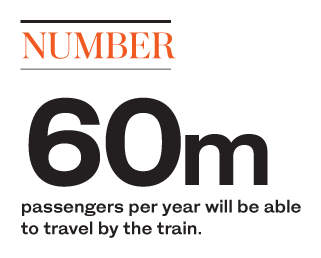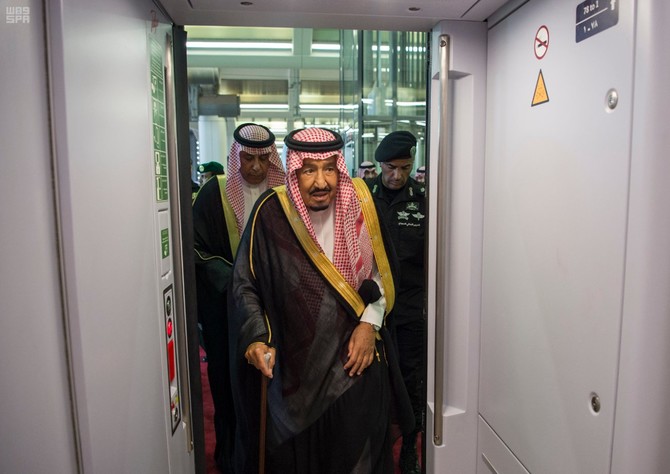JEDDAH: King Salman launched the Haramain High-Speed Railway, the biggest electric speed train project in the Middle East, at Jeddah’s Al-Sulaymaniyah station on Tuesday.
The inauguration ceremony was attended by Prince Khaled Al-Faisal, adviser to the king and governor of Makkah, along with senior officials and dignitaries.
The ceremony concluded with the king taking the train to Madinah. The train was captained by a Saudi national driver, Abdullah Al-Ahmadi.
Minister of transport, Dr. Nabil Al-Amoudi, delivered a speech saying that the Kingdom had always been proud of serving pilgrims. “The two holy places are now closer than ever,” he said.
 He added that King Salman and Crown Prince Mohammed bin Salman had directed the implementation of comprehensive work plans for the transport industry in the Kingdom. He said that the leadership had supported the project to overcome all obstacles so that it could meet the growth in the number of pilgrims and visitors to the two holy places of Makkah and Madinah.
He added that King Salman and Crown Prince Mohammed bin Salman had directed the implementation of comprehensive work plans for the transport industry in the Kingdom. He said that the leadership had supported the project to overcome all obstacles so that it could meet the growth in the number of pilgrims and visitors to the two holy places of Makkah and Madinah.
The Haramain High-Speed Railway project is in line with the objective of Vision 2030, the main goal of which is to increase the number of pilgrims and visitors to the holy places, he said. Transport is a main pillar of the national economy and a key driver of the economic renaissance that will take place under Saudi Arabia’s Vision 2030 strategy.
Al-Amoudi presented a picture to the king, which showed King Abdul Aziz with King Saud at the launch of the first railway project (East Train) in the Kingdom in 1951.
Rumaih Al-Rumaih, chairman of the Public Transport Authority (PTA) and acting president of the Saudi Railways Organization (SRO), said that supervision of the project had ensured the operational efficiency of the project and all facilities were of the highest quality. “We were keen to introduce a trustworthy project that reflects the Kingdom’s care for pilgrims and visitors of holy sites, as well as the citizens and residents of Saudi Arabia,” he said.
Al-Rumaih added that despite the technical and topographical challenges encountered during the project, the Al-Haramain train was one of the great achievements for the service of pilgrims and Umrah performers.
 Al-Rumaih told Arab News that the train can annually transport 60 million passengers onboard a fleet of 35 trains, each one consisting of 417 seats. The trains are equipped with the latest technology to ensure comfort and safety.
Al-Rumaih told Arab News that the train can annually transport 60 million passengers onboard a fleet of 35 trains, each one consisting of 417 seats. The trains are equipped with the latest technology to ensure comfort and safety.
As for women’s participation in the project, Al-Rumaih said that the government was working to provide jobs for young men and women. “Women are the other half of the society and we can see them one day driving our trains,” he told Arab News.
With a speed of 300 km and hour, Al-Rumaih said that the train would cover a distance of 450 km, linking stations in Makkah, Jeddah, King Abdul Aziz International Airport in Jeddah (KAIA), King Abdullah Economic City (KAEC) in Rabigh and Madinah.
The SR60 billion ($16 billion) mega project went through three stages before screens could display journey timetables at the stations. The first stage, which was carried out by a consortium of national and international companies, started with the construction of 130 bridges and 850 water channels, a process in which some 150 million cubic meters of sand and rocks were removed to prepare the route for the train.
- @KingSalman inaugurated the Al-#Haramain Express train at a ceremony in #Jeddahhttps://t.co/wc50pVHPKg pic.twitter.com/cedStBLswB
— Arab News (@arabnews) September 25, 2018
The second stage involved the construction of four stations in Makkah, Jeddah, Rabigh and Madinah. The construction of the fifth station, at the KAIA, was part of the airport project.
The third stage involved the construction of a railway line and the importation of the systems for signals, controls, ticketing and telecommunication.


































